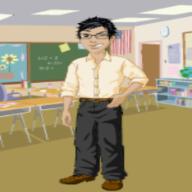唔該幫下手! 感恩
Good morning every one, today our group is here to talk about the didactic lessons in the short stories. First of all, let us define didactic. Didactic is a term used to describe a narrative or other work of art that meant to teach a specific lesson, convey a moral or inspire and provide a mode for proper behaviour.
In the story of “stone”, the didactic lesson is that wars are crude and brutal. They may change someone entirely, therefore we need to keep the peace. The author’s father seemed to be mad after the war. It is told in the story that “Our father had try to kill our mother with a hammer”.
I am convinced that when a child sees his dad wants to murder his mum, he must be extremely frightened and may affect his growth after that. Moreover, the story stated that “then he dragged my covers and threw me onto the floor”.
I can’t imagine how my heart will be broken if my parents abuse me like that. But can you image a father who loves his family before the war, wants to kill his wife and his son after he went back home? Is it because he doesn’t love them anymore?
The answer is certainly NO! The reasons are he felt great shame because he is kicked out by the army and he couldn’t forgot what had happened during the war, many people are died. Not only his enemies, but also his friends in the army and other innocent people.
Every time he remember their death, he becomes crazy and he doesn’t knows what he is doing will hurt his sons. This tragedy will happen on many others families when wars occur. The only way to stop this happen is to keep the peace.
In the romantic story of “Orpheus and Eurydice”, the didactic lesson is that Orpheus disobeyed the gods who gave him a second chance to be with Eurydice, but it is told in the story that
“…Orpheus, in a moment of forgetfulness, to assure himself that she was still following, cast a glance behind him”. He was told “Do not look back” but eventually he looked back. The consequence was a reversal of Eurydice’s salvation.
The story let us know that there is something we can’t forget or disobey, otherwise we will be in big trouble. Just like our Eng4U assignments, don’t forget it unless you don’t want to pass the course. Thank you for your attention, and this is the end of our presentation.

